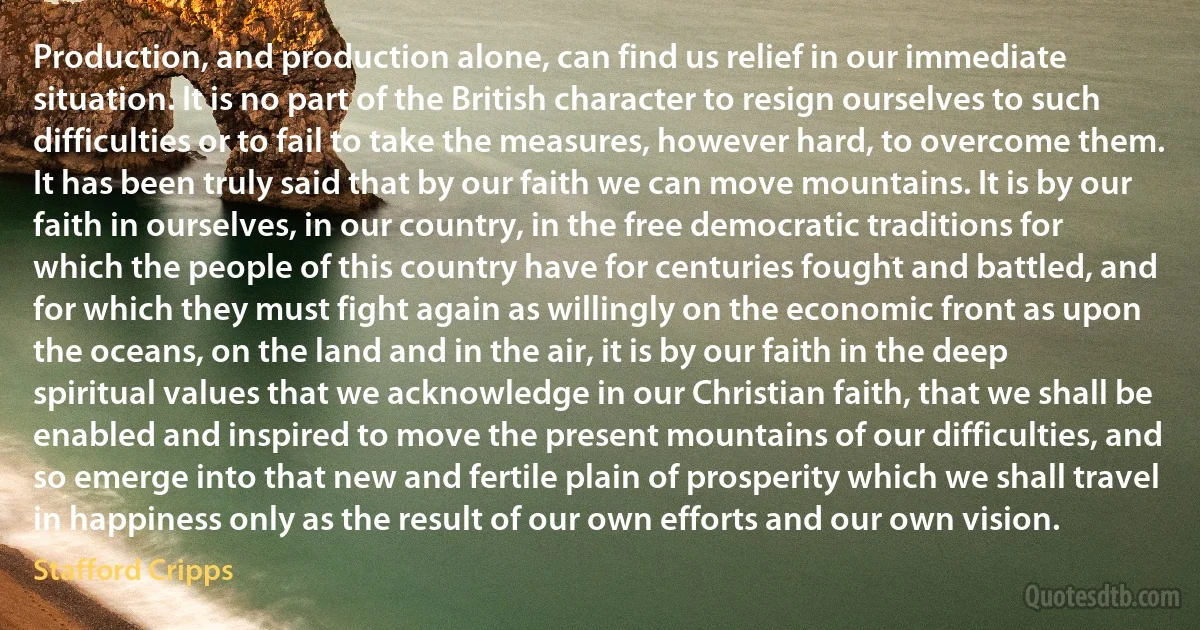
Production, and production alone, can find us relief in our immediate situation. It is no part of the British character to resign ourselves to such difficulties or to fail to take the measures, however hard, to overcome them. It has been truly said that by our faith we can move mountains. It is by our faith in ourselves, in our country, in the free democratic traditions for which the people of this country have for centuries fought and battled, and for which they must fight again as willingly on the economic front as upon the oceans, on the land and in the air, it is by our faith in the deep spiritual values that we acknowledge in our Christian faith, that we shall be enabled and inspired to move the present mountains of our difficulties, and so emerge into that new and fertile plain of prosperity which we shall travel in happiness only as the result of our own efforts and our own vision.
Stafford CrippsRelated topics
air character christian country deep democratic difficulties emerge fail faith fight find free front happiness hard land move overcome people plain present production prosperity result say situation take travel visionRelated quotes
Ever since the population of this little island grew large, trade has been its livelihood. We imported food and raw materials and paid for them by exports of coal and manufactures, by earnings from shipping and other services, and by interest on foreign investments. The first world war injured our position seriously, the second had far worse effects. When we stood alone in the second world war we threw all that we had into the battle... We sold our foreign assets. We reduced our production of civilian goods to a minimum. We lost nearly all our export trade and much of our shipping... We have, therefore, to face now before we have recovered from the effects of the war, and before our long-term plans have taken effect, the necessity of relying entirely on our own resources. This is a situation as serious as any that has faced us in our long history.

Clement Attlee
In this world, as in our own, nearly all the chief means of production, nearly all the land, mines, factories, railways, ships, were controlled for private profit by a small minority of the population. These privileged individuals were able to force the masses to work for them on pain of starvation. The tragic farce inherent in such a system was already approaching. The owners directed the energy of the workers increasingly toward the production of more means of production rather than to the fulfilment of the needs of individual life. For machinery might bring profit to the owners; bread would not. With the increasing competition of machine with machine, profits declined, and therefore wages, and therefore effective demand for goods. Marketless products were destroyed, though bellies were unfed and backs unclad. Unemployment, disorder, and stern repression increased as the economic system disintegrated. A familiar story!

Olaf Stapledon
In the Greek world in which Homer's songs were sung, it was taken for granted that everyone's life is ruled by fate and chance. For Homer, human life is a succession of contingencies: all good things are vulnerable to fortune. Socrates could not accept this archaic tragic vision. He believed that virtue and happiness were one and the same: nothing can harm a truly good man. So he re-envisioned the good to make it indestructible. Beyond the goods of human life - health, beauty, pleasure, friendship, life itself - there was a Good that surpassed them all. In Plato, this became the idea of the Form of the Good, the mystical fusion of all values into a harmonious spiritual whole - an idea later absorbed into the Christian conception of God. But the idea that ethics is concerned with a kind of value that is beyond contingency, that can somehow prevail over any kind of loss or misfortune, came from Socrates. It was he who invented 'morality'.

John N. Gray
What is the good, I ask, in the name of common sense, of prohibiting sweating in this country if you allow sweated goods to come in from foreign countries? If you insist on limitation, of hours and upon precautions for security, bear in mind all these things add to the cost of production, to the difficulties of the manufacturer in selling his goods, and unless you give him some increased price, some increased advantage in compensation, then he cannot carry on competition any longer. All these conditions in the long run will result not to your advantage, for you will have no work to do, but to the advantage of the foreigner, who is not so scrupulous and who conducts his work without any of these conditions...If protected labour is good, and I think in many ways it is...then it is good to protect the results of labour, and you cannot do one without the other.

Joseph Chamberlain
If, therefore, our personal religious life is likely to be sapped by our devotion to social work, it would be a calamity second to none. But is it really likely that this will happen? The great aim underlying to whole social movement is the creation of a free, just, and brotherly social order. This is the greatest moral task conceivable. Its accomplishment is the manifest will of God for this generation. Every Christian motive is calling us to do it. If it is left undone, millions of lives will be condemned to a deepening moral degradation and to spiritual starvation. Does it look probable that we will lose our contact with God if we plunge too deeply into this work? Does it stand to reason that we shall go astray from Jesus Christ if we engage in the unequal conflict with organized wrong? What kind of ‘spirituality' is it which is likely to get hurt by being put to work for justice and our fellow-men?

Walter Rauschenbusch
